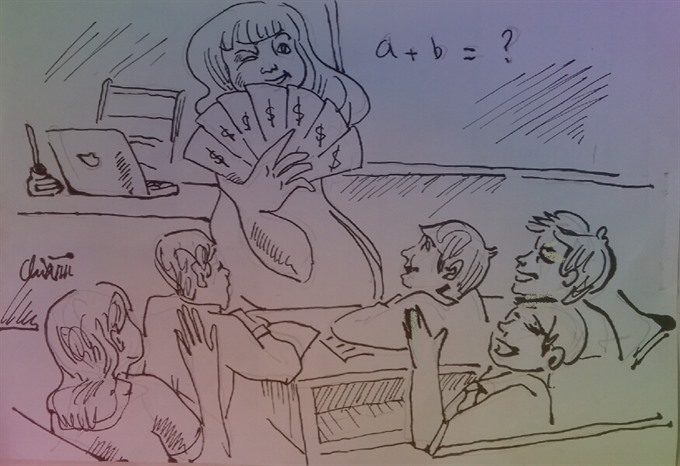 Talk Around Town
Talk Around Town

A video clip featuring a teacher of a secondary school in HCM City giving cash reward for students has gone viral.
 |
| Illustration by Đàm Minh Chí |
A video clip featuring a teacher in a secondary school in HCM City giving cash rewards to students has gone viral.
Dư Thị Lan Hương, a guest teacher of Chu Văn An Secondary School, appeared with some bundles of cash, awarding the money to a long line of students who gained scores of 6.5 points or more in their exams.
The students looked joyful and excited. According to Hương’s rule, students would show their test papers as proof, and receive VNĐ 20,000 ($0.8) for each.
This is not the first time the teacher has given such bonuses to her students. Previously, she offered VNĐ 2,000-3,000 ($0.08-0.13) for those who scored at least 8 points in their exams. The amount of money is small and was used as a way of praising students and encouraging them to study harder in upcoming tests.
The clip has received thousands of shares and comments from the public, mostly showing their interest and praising the teacher’s special method of rewarding students’ good behaviour and motivation.
Looking at the smiles on both teachers and students in the clip, I believe that the students had gained good test results, and the teacher had her own joy giving her students cash incentives to boost their test scores – an incentive she took from her own pocket.
It’s true that ‘do this and get that’ rewards can provide an initially positive result. Cash - in this case – improved students’ grades and gave them something to be excited about.
However, I can’t help asking myself if offering cash bonuses is good solution in the long-term. Is it possible that children will keep doing their best only because of the price tag an adult puts on good behaviour?
In my own experience, rewards were not ineffective in the long term, and even caused worse results over time.
My parents once offered me cash if I gained good scores in math – the subject that I struggled with most when I was a student. At that time, the VNĐ5,000 ($0.2) they offered me was a good sum that could buy a box of candy or a small toy.
The bonus pushed me to study hard and I made progress in the subject, but it didn’t last long.
The feeling of excitement and fun quickly became boring, the reward itself was no longer attractive.
Lê Mai Hương, a teacher at a secondary school in Hà Nội’s Hai Bà Trưng District said that offering rewards for children when they make good progress is necessary. A little treat such as pens, stickers for younger students or a certificate of achievement for teenagers can motivate them to study harder.
Hương said rewards drive students to get things done. However, cash incentives may not be a good idea, she said.
“Children work well in the beginning, but they may come to expect money regularly. This means parents or teachers need to hand over more frequent payments or increase the payment to keep them studying hard,” she said.
In the worst case, it could foster a demanding attitude from students in other areas. They could develop a selfish attitude whenever they are asked to behave or do a task, she said.
Prof Phạm Tất Dong, vice president and general secretary of the Vietnam Association for Learning Promotion told Lao Động (Labour) newspaper that there are many ways to encourage students, and cash bonuses are a rare choice, and should not be implemented.
Dong said he has not seen any teacher use that kind of bonus during his years of teaching. Cash rewards for students with good grades can not become the norm as, for one thing, teachers aren’t wealthy enough to maintain the system of rewards.
More importantly, educating students through cash rewards has never been a method mentioned in the pedagogical environment.
If the reward was money for good grades, it sends the message that the reason to work hard in school is more to earn money than to improve knowledge, he said.
The school should have a discussion to find an appropriate method to encourage students that doesn’t involve this.
Dr Virginia Shiller, a psychologist and instructor at the Yale Child Study and co-author of the book Rewards for Kids wrote that rewards can help parents teach their children new habits.
The key is in how the incentives are given, in setting appropriate, realistic goals, and in figuring out a strategy to achieve them.
Indeed, money can’t buy motivation or academic success. It can’t nurture children to cultivate a love of learning and a sense of responsibility for their own education.
Parents and teachers can’t give the carrot as a means of motivation forever. Good scores will not totally guarantee their future success.
Children should be guided to behave for the betterment of themselves. Good behaviour should always be its own reward. – VNS




